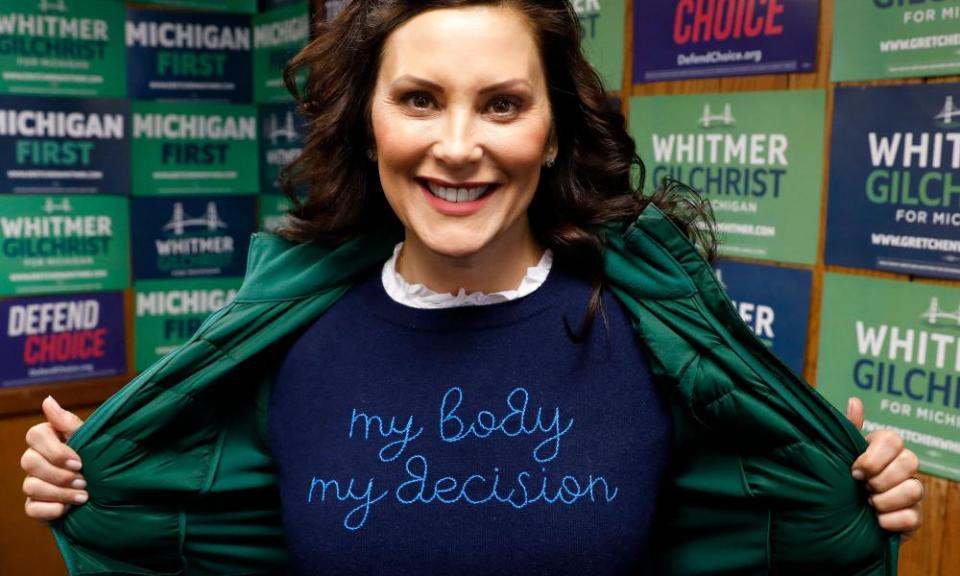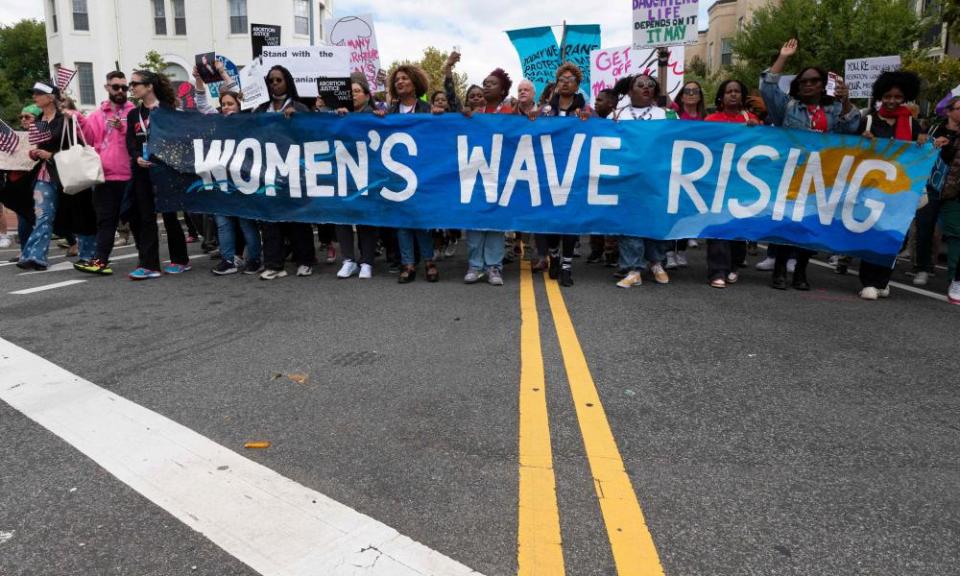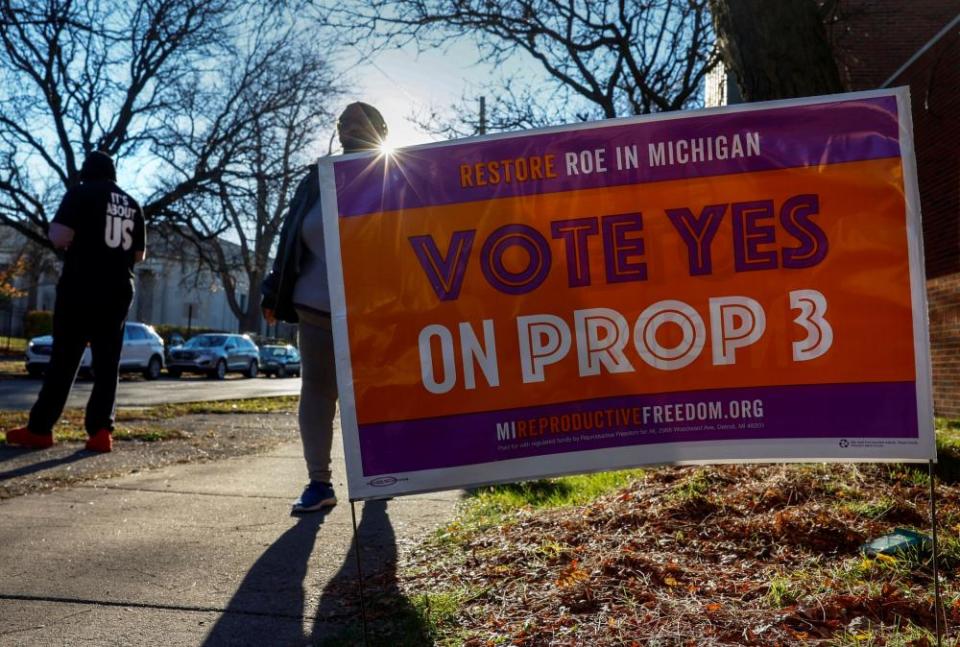How the fall of Roe shattered Republicans’ midterm dreams
This summer, after a tectonic decision by the supreme court to overturn Roe v Wade eliminated the nearly 50-year constitutional right to abortion, Joe Biden predicted American women would revolt. Republicans, however, saw a “red wave” brewing, fueled by widespread economic discontent.
On Thursday, after Democrats defied historical expectations in the first major election of the post-Roe era, Biden effectively declared: “I told ya so.”
Related: Young voters hailed as key to Democratic successes in midterms
“Women in America made their voices heard, man,” the president told a crowd of supporters at the Howard Theater in Washington on Thursday. “Y’all showed up and beat the hell out of them.”
The 2022 midterm elections were expected to usher in staggering losses for Democrats. The party in power typically fares poorly, and with Biden’s approval ratings mired in the low 40s, Republicans were expected to make significant gains.
That is not how the results unfolded. As the vote count continues in several key races, Republicans appear on track to win a far narrower House majority than they hoped, while Democrats may retain control of the Senate.
As a fuller portrait of the results emerges, advocates, Democrats and even some Republicans say one thing is clear: abortion proved a defining issue. Fury over the loss of federal abortion protections galvanized women and young people and delivered a string of unexpected victories for Democrats and new protections for reproductive rights.
“You cannot have half of the population have their body autonomy put under threat and not expect it to be mobilizing,” said Heidi Sieck, the CEO and co-founder of #VoteProChoice. “And that’s what we saw across the board with young people showing up, women showing up, newly registered women being more than two- thirds of the newly registered voters.”

Exit polls conducted for news networks by Edison Research showed that abortion was the top issue for many Americans, especially young people under the age of 30. And about 60% of voters said they were dissatisfied or angry with the supreme court’s decision to overturn Roe, according to exit polls conducted by AP Votecast.
In every state where an abortion-related measure was on the ballot, voters chose either to enshrine protections or reject new limits. And it was a decisive issue in battleground states like Michigan and Pennsylvania, where the future of abortion access was at risk.
In Michigan, voters decisively approved a ballot initiative establishing a state constitutional right to reproductive freedom, effectively stopping a 1931 abortion ban from ever taking effect..
They also lifted Democrats to power at all levels of government, re-electing governor Gretchen Whitmer and attorney general Dana Nessel and wresting control of the state legislature from Republicans for the first time in decades. Whitmer defeated Tudor Dixon, a Trump-backed Republican who said she opposed abortion in nearly all cases, including when the pregnancy results from rape or incest.
Heidi SieckYou cannot have half of the population have their body autonomy put under threat and not expect it to be mobilizing
Ahead of the election, Michigan congresswoman Elissa Slotkin, who was considered one of the most vulnerable Democrats, told the Guardian that she believed her political fate was tied to the result of the state’s abortion proposal. On Tuesday, she held on comfortably.
In Pennsylvania, where exit polls showed that abortion was the top issue on voters’ minds, Josh Shapiro, the Democratic nominee for governor, won in landslide. He defeated Doug Mastriano, a far-right conservative and one of his party’s most strident opponents of abortion rights.
Democrat John Fetterman won the race for Senate against Republican Mehmet Oz, after seizing on a remark that Oz made during a debate in which he appeared to suggest that the decision to have an abortion should rest with women, doctors and “local political leaders”.
The issue resonated in red states and blue ones. Like Michigan, California and Vermont approved ballot initiatives to protect abortion in their state constitutions. Meanwhile, in deep red Kentucky, voters rejected a ballot initiative that would have explicitly denied constitutional protections for abortion, even as they granted Republican senator Rand Paul another term. And in Montana, another reliably conservative state, an attempt to impose new restrictions on the procedure failed.

David Shor, a Democratic data analyst, told the Guardian’s Politics Weekly America that abortion was “absolutely instrumental” in Democrats’ successes this cycle.
“Abortion really up until very recently was a pretty neutral issue for Democrats – that didn’t mean it was bad, but it wasn’t necessarily a vote-getter in most of the country,” he said. But following the the supreme court decision, he said abortion suddenly became “the single best issue for Democrats”.
“The extent to which voters cared about abortion also skyrocketed,” he said. “Out of the 33 issue areas that we track, abortion went from being the 30th out of 33 most important issues to being the 12th basically overnight.”
In the wake of Roe’s fall, Democrats took every opportunity to highlight their support for abortion rights and contrast it with their opponents. They flooded the airwaves with nearly half a billion dollars on abortion-related ads.
Voters gave Democrats a wide advantage on the issue, as debates over the loss of abortion rights raised new questions about miscarriage care, exceptions for rape, incest and life of the mother. Republicans, on the defensive, sought to avoid the issue. In several instances, Republican candidates removed references to abortion from their campaign websites.
But months later, as the campaign season came to a close, Democrats were second guessing the strategy. Many pre-election polls showed voters worried more about inflation and crime than abortion. These surveys prompted a bout of angst and finger-pointing. Some Democrats charged that the party had focused too singularly on reproductive rights at the expense of offering a clear economic message.
David ShorAbortion went from being the 30th out of 33 most important issues to being the 12th basically overnight
But pro-abortion advocates say their logic is flawed – that abortion is an economic issue.
“If you’re saying inflation, if you’re saying economy, you’re saying reproductive freedom as well,” Sieck said. “We absolutely miss that connection at our peril.”
After Tuesday night, there was little doubt that the issue had been decisive in key races.
“For everyone who said abortion was a losing issue; for everyone who said abortion is controversial; for everyone who said abortion is a fringe concern and not the meat-and-potatoes kitchen table problem Michiganders care about: you’re wrong, and the ‘yes’ votes prove it,” said Mini Timmaraju, the president of Naral Pro-Choice America.
Even some Republicans conceded the issue may have cost them electorally.
“If we lost because of abortion, an issue that was not on the ballot, if we lost because I’m pro-life, because I believe every life has dignity, I’m OK with that,” Matt Birk, the Republican nominee for lieutenant governor in Minnesota said in a concession speech.

The string of victories for supporters of abortion rights followed an August vote in Kansas, when voters overwhelmingly rejected an attempt to remove abortion rights from its state constitution. The result underscored the political potency of an issue Democrats had long tiptoed around.
On Tuesday, Laura Kelly, the state’s Democratic governor, held off a Republican challenge as did Democratic congresswoman Sharice Davids. With the veto pen, Kelly, like Wisconsin governor Tony Evers, who also won re-election in a closely-watched race, can block any potential legislation that would impose new restrictions on the procedure.
In Wisconsin and North Carolina, Democrats kept Republicans from winning a supermajority in their state legislatures, meaning lawmakers will not have the power to override a Democratic governor’s veto and pass new abortion restrictions.
Mini TimmarajuAbortion is a winning issue and will continue to be in elections to come
There were some bright spots for anti-abortion advocates. Conservative judges were elected to the state supreme courts in Ohio and North Carolina, an encouraging sign for anti-abortion proponents bracing for a barrage of challenges to new laws restricting the procedure. Though Democrats may keep the US Senate, they failed to win 52 seats, enough to overcome the resistance in their party to eliminating the filibuster and codifying Roe.
And key races have yet to be called in Arizona, where the Republican nominee for governor, Kari Lake, has backed a territorial-era abortion ban temporarily halted by a judge.
None of what unfolded this election cycle surprised longtime supporters of reproductive rights, but they hope the results will finally convince Democrats that abortion is not only a winning political issue, but a foundational one that should be central to their campaign strategy and governing agendas at the state and federal level.
“Abortion is a winning issue and will continue to be in elections to come,” Timmaraju said on Friday. “That means Democrats need to keep reproductive freedom at the top of their policy agenda and fight to not only codify Roe but expand access to abortion and birth control.”

 Yahoo News
Yahoo News 

